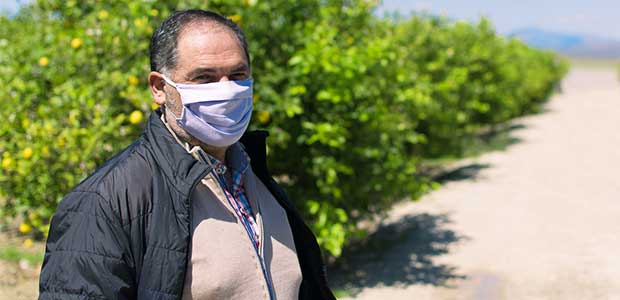
Farmers Continue Work with Minimal Coronavirus Protection
Agriculture farms continue to operate to grow crops and feed the country, but with minimal federal protections against the coronavirus, many farmers are worried about contracting the virus on the job.
Farms across the country are busier than ever, and most are fully staffed with workers who live locally, workers on temporary agriculture visas and migrant workers to travel from farm to farm. No matter the background of the worker, though, the agriculture industry has been given little federal protection against the coronavirus.
One recent article goes into the growing concern agriculture farmers have that their ‘business-as-usual’ operations could mean something bad if an outbreak happens.
One tomato farm in eastern Tennessee is home to hundreds of workers—local and non-local—who are working full days, in close contact with one another and with little PPE or coronavirus protection.
These workers live in close quarters, sleep in bunk beds and share bathrooms and kitchens. They ride crowded buses to work and often work in groups. Although agriculture workers are considered “essential,” they do not have health insure or paid sick leave.
“Almost every part of the process for picking tomatoes needs to be considered in light of COVID-19,” says Ken Silver, an associate professor of environmental health at East Tennessee State University, who studies migrant worker health on Tennessee tomato farms.
A number of farms across the country have already dealt with outbreaks, including farms in California, Washington, Florida and Michigan. The U.S. government, though, has yet to establish any enforceable rules to protect farmworkers from COVID-19 or instruct employers on how to proceed if their worker gets sick.
Migrant worker advocacy groups say the lack of federal guidance causes employers to take advantage of their workers and disregard their risk of infection. Farms say they are doing what they can to protect workers with the resources at hand, while also harvesting the crops.
However, the situation is complicated because it varies from employer to employer. Plus, the fact that many agriculture workers are migrant workers or in the U.S. on worker visas mean that often times, if they have the virus, they are sent back to their countries. This creates a strong incentive for workers not to report mild symptoms.
Plus, agriculture employers admit that basic methods to stop transmission—like social distancing and mask-wearing—are not feasible or easy to enforce, especially in hot temperatures.
On one Tennessee farm in June, 10 of 80 total workers tested positive for the virus. Another farm in that county had about 38 workers test positive. The National Center for Farmworker Health said that there have been at least 3,6000 cases of farmworkers testing positive for COVID-19.
One 52-year-old, temporary farmworker, Saul, has traveled from Mexico to Virginia for the last 23 years to harvest tobacco. In a WhatsApp interview, he said masks are uncomfortable on the job since he works outside. He said that when he arrived in the U.S. in April, the farm provided him with information about the pandemic, masks and hand sanitizer. He does not get his temperature taken, but he works with seven others and lives with three. No one on his farm has yet tested positive for the virus.
Still, the Department of Labor has not offered enforceable federal safety standards for COVID-19. It did, however, work with the CDC to publish a set of voluntary, agriculture-specific guidelines, released in June.
While some farms have gone as far as to take workers’ temperatures, install plastic shields if six feet of distance is not possible between workers and place hand-washing stations around the area, many have not done such measures, as federal guidelines are technically voluntary.
Reports of how many agriculture workers are/have been infected is complicated, however. Because many are migrant workers, seeking a doctor’s care can feel risky. Workers who are undocumented might worry about being detained, and workers who have green cards may be concerned about the Trump administration’s “public rule charge.” This controversial rule “weighs immigrants’ use of public programs, including health care, against their applications for citizenship. However, the federal government has said seeking treatment for COVID-19 wouldn’t fall under the rule.”
Plus, many health departments do not have translators on staff who can speak Spanish or Indigenous Central American languages, and there has not yet been systematic, nationwide tracking of farmworker outbreaks thus far.
So “it’s really hard to get a grasp on how many farmworkers specifically are testing positive,” says Guild with Farmworker Justice in the NPR article.
Despite these issues, though, the farming continues on and Americans continue to expect stocked supplies of produce in stores.